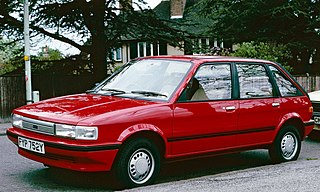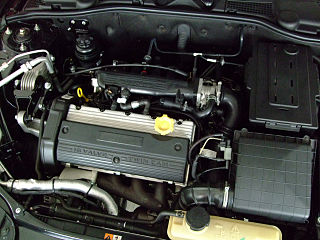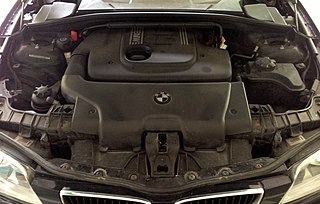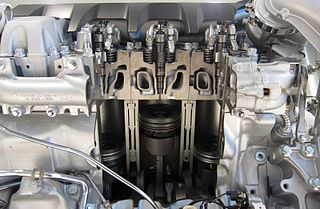Related Research Articles

Land Rover is a British brand of predominantly four-wheel drive, off-road capable vehicles, owned by multinational car manufacturer Jaguar Land Rover (JLR), since 2008 a subsidiary of India's Tata Motors. JLR currently builds Land Rovers in Brazil, China, India, Slovakia, and the United Kingdom. The Land Rover name was created in 1948 by the Rover Company for a utilitarian 4WD off-road vehicle; currently, the Land Rover range is comprised solely of upmarket and luxury sport utility vehicles.

MG Rover Group was the last domestically owned mass-production car manufacturer in the British motor industry. The company was formed when BMW sold the car-making and engine manufacturing assets of the original Rover Group to the Phoenix Consortium in 2000.

The Rover Group plc was the British vehicle manufacturing conglomerate known as "BL plc" until 1986, which had been a state-owned company since 1975. It initially included the Austin Rover Group car business, Land Rover Group, Freight Rover vans and Leyland Trucks. The Rover Group also owned the dormant trademarks from the many companies that had merged into British Leyland and its predecessors such as Triumph, Morris, Wolseley, Riley and Alvis.
Phoenix Venture Holdings (PVH), also known as the Phoenix Consortium, was an English company formed by four businessmen. Following BMW's break-up of the Rover Group a financially complex deal involving a £500 million "dowry payment" from BMW, resulted in PVH purchasing the Rover marque in May 2000 for the notional sum of £10, relaunching the car company as MG Rover. MG Rover and related companies placed themselves in administration on 8 April 2005.

The Metro is a supermini car, later a city car that was produced by British Leyland (BL) and, later, the Rover Group from 1980 to 1998. It was launched in 1980 as the Austin mini Metro. It was intended to complement and eventually replace the Mini, and was developed under the codename LC8. The Metro was named by What Car? magazine as 'Car of The Year' in 1983 as an MG, and again as the Rover Metro in 1991.

The Austin Maestro is a five-door hatchback small family car that was produced from 1982 to 1987 by British Leyland, and from 1988 until 1994 by Rover Group, as a replacement for the Morris Marina and Austin Allegro. The car was produced at Morris' former Oxford plant, also known as Cowley, with 605,000 units sold. Today, the redeveloped factory builds the BMW Mini. An MG-branded performance version was sold as the MG Maestro from 1983 until 1991.

The Rover K-series engine is a series of internal combustion engines built by Powertrain Ltd, a sister company of MG Rover. The engine was a straight-four cylinder built in two forms, SOHC and DOHC, ranging from 1.1 to 1.8 L; 67.9 to 109.6 cu in.

The Rover 800 series is an executive car range manufactured by the Austin Rover Group subsidiary of British Leyland, and its successor the Rover Group from 1986 to 1999. It was also marketed as the Sterling in the United States. Co-developed with Honda, it was a close relative to the Honda Legend and the successor to the decade-old Rover SD1.

The Austin Montego is a British family car that was produced by British Leyland from 1984 until 1988, and then by Rover Group from 1988 until 1995. The Montego was the replacement for both the rear-wheel drive Morris Ital and the front-wheel drive Austin Ambassador ranges to give British Leyland an all-new competitor for the Ford Sierra and Vauxhall Cavalier.

The Rover 200 Series, and later the Rover 25, are a series of small family cars that were produced by British manufacturer Rover from 1984 until 2005.

The Land Rover Freelander is a compact luxury crossover SUV that was manufactured and marketed by Land Rover from 1997 to 2015. The second generation was sold from 2007 to 2015 in North America and the Middle East as the LR2 and in Europe as the Freelander 2. The Freelander was sold in both two-wheel and four-wheel drive versions. The name 'Freelander' is derived from the combination of 'Freedom' and 'Lander'.

The Land Rover Defender is a series of British off-road cars and pickup trucks. They consistently have four-wheel drive, and were developed in the 1980s from the original Land Rover series which was launched at the Amsterdam Motor Show in April 1948. Following the 1989 introduction of the Land Rover Discovery, the term 'Land Rover' became the name of a broader marque, and thus no longer worked as the name of a specific model; thus in 1990 Land Rover renamed the 90 and 110 as Defender 90 and Defender 110 respectively. The 127 became the Defender 130.

The Rover 75 is an executive car manufactured initially by the Rover Group and later by MG Rover, under the Rover marque and available over a single generation with front-wheel drive in either saloon/sedan or station wagon/estate configurations. Later variants included an extended-wheelbase model, and a rear-wheel drive variant with a V8 engine. In 2001, MG Rover launched a badge engineered variant, the MG ZT. A coupe concept was built, but did not receive further development.

The Rover 400 Series, and later the Rover 45, are a series of small family cars that were produced by the British manufacturer Rover from 1990 to 2005. The cars were co-developed as part of Rover's collaboration with Honda. The first-generation 400 was based on the Honda Concerto, and the Mark II 400 was based on the Honda Domani/Civic.

The BMW M47 and Rover Group M47R are straight-4 Diesel engines. Variants were manufactured by BMW from 1998 to 2007. BMW gradually adopted high-pressure common rail fuel injection systems over the lifetime of the M47.

Common rail direct fuel injection is a direct fuel injection system built around a high-pressure fuel rail feeding solenoid valves, as opposed to a low-pressure fuel pump feeding unit injectors. High-pressure injection delivers power and fuel consumption benefits over earlier lower pressure fuel injection, by injecting fuel as a larger number of smaller droplets, giving a much higher ratio of surface area to volume. This provides improved vaporization from the surface of the fuel droplets, and so more efficient combining of atmospheric oxygen with vaporized fuel delivering more complete combustion.

The MG F and MG TF are mid-engined, rear wheel drive roadster cars that were sold under the MG marque by three manufacturers between 1995 and 2011.

The KV6 automotive petrol engine has a 24-valve quad-cam V6 configuration, and a pressurising variable-length intake manifold to add hot spots throughout the rev range. Variants exist in 2.0 to 2.5 litres capacities. These were built initially by Rover Group, then by Powertrain Ltd. KIA manufactured KV6 in Korea under licence. Production moved from the UK to China in 2005, re-designated NV6.
The L-series engine is an automotive diesel engine built by Powertrain Ltd, a sister company of MG Rover.

Engines used by the British company Land Rover in its 4×4 vehicles have included four-cylinder petrol engines, and four- and five-cylinder diesel engines. Straight-six cylinder engines have been used for Land Rover vehicles built under licence. Land Rover has also used various four-cylinder, V8, and V6 engines developed by other companies, but this article deals only with engines developed specifically for Land Rover vehicles.
References
- ↑ "MG Rover Group Limited and subsidiary companies - In administration - sale of assets" (Press release). PriceWaterhouseCoopers. 22 July 2005. Archived from the original on 3 March 2007.
- ↑ "Outbreak of respiratory disease at Powertrain Ltd, Longbridge, Birmingham" (PDF). Health and Safety Executive . Retrieved 24 August 2012.